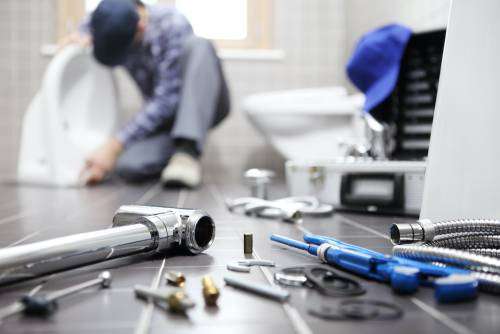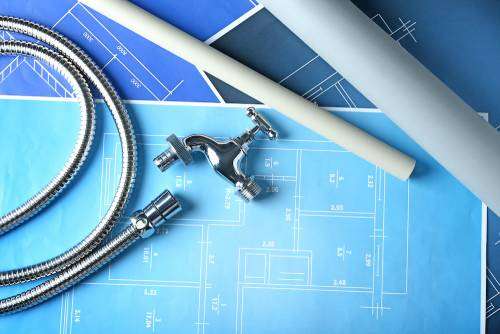
Are you thinking of starting a plumbing business of your own? If so, you’re in for a lot of hard work – but it can also be a very rewarding career.
In this article, we will discuss the basics of getting your plumbing business set up, from figuring out the model of your business to getting the necessary licences and insurances. We’ll also talk about how to find customers and market your services. So if you’re ready to take the plunge into self-employment, read on.
Making the decision to start a plumbing business of your own is a big step. There are a lot of important factors to consider, from licences and insurance to finding the right location and marketing your business. But with careful planning and a little hard work, it can be a very rewarding experience.
Here are some of the steps you’ll need to take in order to start a plumbing business of your own.
Choosing a Business Model for Your Plumbing Company
One of the first things you need to do when setting up a plumbing business and creating your business plan is to decide what type of business model you want to operate under.
There are several different options available, including sole trader, partnerships, limited liability companies and corporations registered with Companies House.
Each option has its own advantages and disadvantages, so it’s important to do your research and choose the set up that’s right for you when making your business plan.
Getting the Necessary Licences and Insurances in the Plumbing Industry
One of the most important things to think about when you start a plumbing business is getting the necessary licences and insurances.
Any business is a risk, but some are riskier than others. This is certainly true of businesses offering plumbing services, which come with a host of potential liabilities.
In the UK, there are a number of licences and insurance policies that plumbers must have in order to operate legally. These include public liability insurance, which covers damages or injuries caused by the plumbing work, and professional indemnity insurance, which protects against any claims that may arise from professional negligence.
There are also several other types of insurance which are worth considering, which we will look at below. In addition, plumbers must also obtain a Gas Safe registration, which allows them to work with gas appliances.
Here’s a brief run down on the most important licences and insurances you’ll need to get:
Gas Safe registration
 In the United Kingdom, all plumbers must be registered with Gas Safe in order to legally work with gas appliances. This is because gas can be very dangerous if it is not installed or maintained properly. Gas explosions are rare, but they do happen, and when they do, they can cause serious damage to property and even loss of life.
In the United Kingdom, all plumbers must be registered with Gas Safe in order to legally work with gas appliances. This is because gas can be very dangerous if it is not installed or maintained properly. Gas explosions are rare, but they do happen, and when they do, they can cause serious damage to property and even loss of life.
Gas Safe registration ensures that plumbers have the training and experience necessary to work safely with gas. In addition, Gas Safe inspectors regularly check the work of registered plumbers to make sure that they are meeting the highest standards. As a result, Gas Safe registration gives both plumbers and their customers peace of mind knowing that the work will be done safely and correctly.
To work as a gas safe registered engineer in the United Kingdom, plumbers must first complete a gas safety training course. Gas safety courses are typically offered by technical colleges or private training providers.
Once they have completed the course, plumbers must then pass a Gas Safe Register assessment before they can be officially registered. The Gas Safe Register is the official UK body that regulates gas engineers and controls their certification.
In order to ensure that plumbers are up to date on the latest Gas Safe guidelines, they must also renew their registration every year.
By following these steps, plumbers can ensure that they are legally qualified to work with gas appliances and systems in the UK.
Employer’s liability
Any business that employs staff needs to have employer’s liability insurance in place. This is especially true for businesses offering plumbing services, as they often have staff working in potentially dangerous environments.
Employer’s liability cover protects businesses from claims made by employees who are injured or become ill as a result of their work. Without this insurance, businesses could be faced with huge financial costs if an employee decides to take legal action. Employers’ liability cover can provide peace of mind for business owners, knowing that they are protected against any potential claims.
For these reasons, it is essential for all plumbing businesses to have employer’s liability insurance in place.
Public liability
As a plumbing business owner in the United Kingdom, you need to have public liability cover.
This type of insurance protects you from financial damages if someone is injured or their property is damaged because of your business operations. Without this coverage, you could be financially responsible for any losses incurred by the injured party.
Additionally, public liability cover can help to cover the cost of legal fees if you are sued.
While the cost of premiums is an added expense, the peace of mind and financial protection that public liability cover offers is essential for any business owner.
Here are a few reasons why UK businesses offering plumbing services need public liability cover:
- To protect against third-party lawsuits: If someone is injured or their property is damaged because of your work, they could sue you for compensation. Public liability cover can help to cover the cost of these lawsuits, including any damages that may be awarded.
- To cover the cost of repairs: In the event that your work causes damage to someone else’s property, you will be responsible for repairing the damage. Public liability cover can help to cover the cost of these repairs, ensuring that you are not out of pocket.
- To safeguard your business: Having public liability cover in place can help to safeguard your business against financial loss in the event that someone sues you. This type of insurance can help to ensure that your business can continue to operate even if you are faced with a costly lawsuit.
So as you can see, if you are looking for ways to protect your business, public liability cover should be one of your most important priorities.
Professional indemnity
In the United Kingdom, all plumbing businesses are required to have professional indemnity insurance. This type of insurance protects businesses from claims that may arise from their work.
Professional indemnity insurance can cover a wide range of potential risks, including negligence, breach of contract, and professional errors.
A plumbing business is a service that provides installation, repair, and maintenance of water pipes, drainage systems, and other plumbing fixtures. As such it is important for a plumbing business to have professional indemnity insurance to protect the business from any legal liability arising from the provision of faulty workmanship or products.
This type of insurance will cover the costs of any damages that may be awarded to a client as a result of substandard work or products. In addition, professional indemnity insurance will also cover the costs of litigation and defence against any claims made by clients. So it is an essential type of insurance for any plumbing business.
Professional indemnity insurance will give you the peace of mind that your business is protected against any legal liabilities that may arise from your work. While some businesses may view this insurance as an unnecessary expense, the truth is that it can be essential for protecting the business from financial ruin.
In the event that a customer suffers damages as a result of the work of a plumbing business, the business will be able to rely on its professional indemnity insurance to cover the cost of any settlements or judgments that may be awarded.
Without this type of protection, a plumbing business could be forced to close its doors for good.
Other insurances to consider
 Depending on the type of work your plumbing business will undertake, there are several other types of insurance you may want to consider.
Depending on the type of work your plumbing business will undertake, there are several other types of insurance you may want to consider.
For instance, if you plan to take on work where you will be working on a contractor’s property development or building site, some of your insurance needs may differ from those of a plumbing engineer doing domestic plumbing for residential clients.
Some of the other types of insurance cover to consider depending on your circumstances are:
- Contract performance bonds
- Product guarantee insurance
- Directors and officers liability cover
- Legal expenses and employment law protection
- Motor fleet insurance
If you’d like some help navigating the types of insurances your business will need, please do get in touch with us at Construction Insure. We have the experience and understanding of the plumbing and heating industry, as well as a wide range of contact within it, to be able to offer you the advice you need and broker the best insurance deals for you.
While it may seem like a lot of paperwork, getting the necessary licences and insurances is essential for any plumbing business. Without these, you could be facing some serious legal consequences.
Getting these things in order before you start marketing your business will help you avoid any problems down the road.
Marketing Your Plumbing Business
Once you have your business licences and insurance in place, it’s time to start finding customers.
When you’re first starting out, marketing your plumbing business can seem like a daunting task. But with a little creativity and effort, you can get the word out and start attracting customers in no time.
One of the simplest and most effective ways to market your business when self-employed is through word-of-mouth. Let your friends, family, and neighbours know that you’re open for business, and ask them to spread the word. When you do a good job you’re also sure to get more repeat business.
You can also hand out flyers in high-traffic areas, or take out a small ad in the local paper.
One of the best ways to market your new plumbing business is by networking with other local businesses in your area. Get a business stand at trade shows and events, join local chambers of commerce, and get involved with community organisations.
However if you want to reach a wider audience of potential customers, you should seriously consider creating a website and/or social media page for your business. Nowadays most people will begin their search for a service online. Ensuring your small business shows up on on Google when they search for local plumbers will give you a head start.
Make sure to include your contact details and plumbing services offered, and post regular updates to keep people interested.
With a little effort, you’ll be well on your way to success as a plumbing business owner.
If you’re ready to start your own plumbing business, follow the tips in this article to get started on the right foot. With a little hard work and dedication, you can be running a successful plumbing business in no time.

